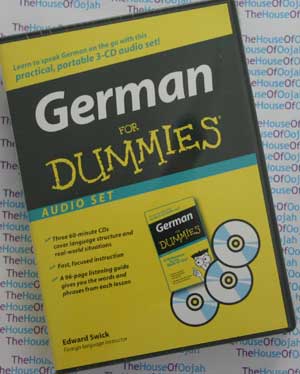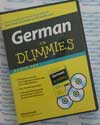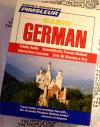German for Dummies 3 Audio CDs + Listening Guide - Learn to speak German

German for DummiesGet Other German Language Learning click here |
 |
German for Dummies - 3 Audio CDs and Listening GuideBrand New (Listening Guide and 3 CDs): The fun and easy way to communicate effectively in a new language! Want to speak German? Don't have a lot of time? This practical audio set is designed to help you learn quickly and easily at home or on the road. From basic greetings and expressions to grammar and conversations, you'll grasp the essentials and start communicating right away! Plus, you can follow along with the handy 96-page portable guide - filled with the words and phrases you'll hear on the CDs, plus a mini dictionary. Discover how to:
Ask questions and understand answers Build your vocabulary Talk about numbers, time, and the calendar Ask for directions Get help at a hotel, the bank, or a store Skip around and learn at your own pace * CD 1: Get started with basic words and phrases. CD 2: Form sentences and practice parts of speech CD 3: Handle real-world situations. About the Author Edward Swick Edward Swick has been a foreign language instructor for more than 30 years. He works on German and ESL instructional materials. About the German Language
In German linguistics, only the traditional regional varieties are called dialects, not the different varieties of standard German. Standard German has originated not as a traditional dialect of a specific region, but as a written language. However, there are places where the traditional regional dialects have been replaced by standard German; this is the case in vast stretches of Northern Germany, but also in major cities in other parts of the country. Standard German differs regionally, especially between German-speaking countries, especially in vocabulary, but also in some instances of pronunciation and even grammar and orthography. This variation must not be confused with the variation of local dialects. Even though the regional varieties of standard German are only to a certain degree influenced by the local dialects, they are very distinct. German is thus considered a pluricentric language. In most regions, the speakers use a continuum of mixtures from more dialectical varieties to more standard varieties according to situation. In the German-speaking parts of Switzerland, mixtures of dialect and standard are very seldom used, and the use of standard German is largely restricted to the written language. Therefore, this situation has been called a medial diglossia. Swiss Standard German is only spoken with people who do not understand the Swiss German dialects at all. It is expected to be used in school. Standard German is the only official language in Liechtenstein and Austria; it shares official status in Germany (with Danish, Frisian and Sorbian as minority languages), Switzerland (with French, Italian and Romansch), Belgium (with Dutch and French) and Luxembourg (with French and Luxembourgish). It is used as a local official language in Italy (Province of Bolzano-Bozen), as well as in the cities of Sopron (Hungary), Krahule (Slovakia) and several cities in Romania. It is the official language (with Italian) of the Vatican Swiss Guard. German has an officially recognized status as regional or auxiliary language in Denmark (South Jutland region), France (Alsace and Moselle regions), Italy (Gressoney valley), Namibia, Poland (Opole region), and Russia (Asowo and Halbstadt). German is one of the 23 official languages of the European Union. It is the language with the largest number of native speakers in the European Union, and, shortly after English and long before French, the second-most spoken language in Europe. |
German for Dummies - 3 Audio CDs and Listening Guide |
| Retail: | $32.95 |
| On Sale: | $29.87 |
| You Save: | 10% |
| Stock Info: | Out Of Stock |
| Receive In Stock Notification |

 0 Items (Empty)
0 Items (Empty)






 (Custom).png)
